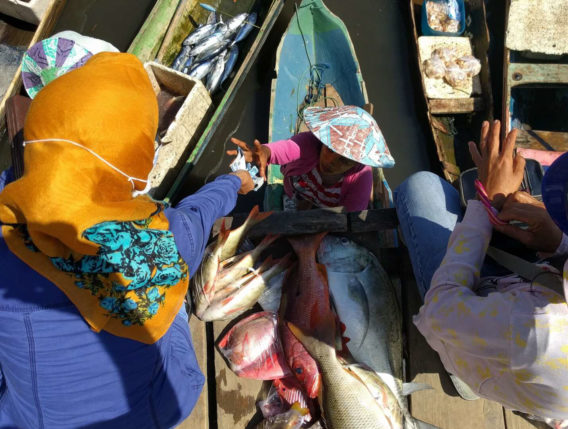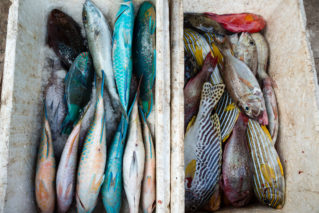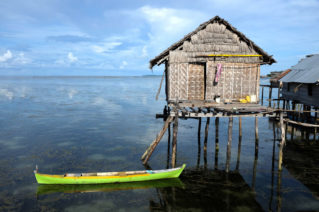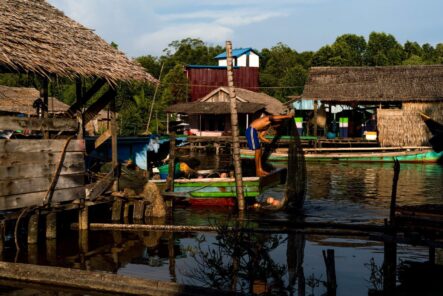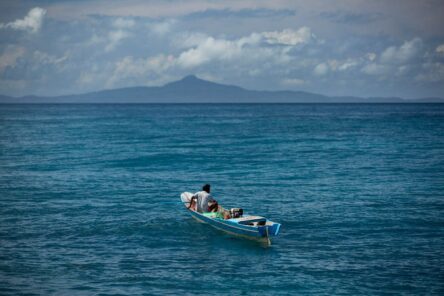This post is also available in:
 Indonesian
Indonesian
Conversations with communities are happening through the help of our partner network in Indonesia. Efra (YAPEKA), Alfi, Fitria, Melly (Yayasan Planet Indonesia), and Nurmayanti (Forkani) interviewed community members personally either over the phone or face to face.
It was early July, Nurmayanti was sitting in a wooden chair at Forkani’s office in Kaledupa, Wakatobi, Southeast Sulawesi, Indonesia, when she saw something out of the ordinary. She noticed four Bajo women, barefoot, pushing a cart full of fish – lajang (seed mackerel) and cakalang (skipjack tuna) – selling them around the village.
They were shouting, “Lajang fish, cakalang fish,”
Fishers’ income significantly dropped as the fisheries supply chain was cut off and the traditional market had fewer visitors with limited operating hours.
Normally, they would sell their husband’s catches in the local market. But because of the evolving COVID-19 pandemic, life isn’t normal anymore for these coastal communities. Fishers’ income significantly dropped as the fisheries supply chain was cut off and the traditional market had fewer visitors with limited operating hours.
“Mama, I want to buy some fish,” said Nurmayanti, who bought 10 lajang for only Rp20,000 (about £1.03), which was a cheaper price than usual. For these women, this reduced price was still better than nothing, “Better to sell cheap than being left with nothing but rotten fish,” they said.
The Bajo people are an Indonesian ethnic tribe, known for their nomadic, sea-faring existence. Nurmayanti learned that these Bajo women came by boat from Bajo Sampela, a floating village near Kaledupa Island. To sell their husband’s catch, they rented the cart on the island and walked several kilometers around six villages in Kaledupa, in the hope that they would earn enough money to feed their families.
The everyday struggle of women
Now, because of the global pandemic, the burden for women is even heavier than before.Nurmayanti works with Forkani, an organisation dedicated to developing community-based coastal management in Wakatobi. Responsible for Forkani’s health programme and collaborating with regional health institutions, Nurmayanti knows a lot about working with coastal women. Women play a major role in the small-scale fisheries sector here, supporting their fishermen husbands in handling and selling catches, and looking after their homes and taking care of the children at the same time. Now, because of the global pandemic, the burden for women is even heavier than before.
Nurmayanti told me the story of Mama Asrami, her neighbour in South Kaledupa. She and her husband are seaweed farmers with four children. “I am exhausted every day. I often get a headache and aching muscles,” said Mama Asrami to Nurmayanti.
We are working all day long, morning until night. As a seaweed farmer, I clean and dry the long line ropes and tie the seaweed seed to them. At home, I take care of the housework, washing clothes and dishes and looking after my family of six,” she added.
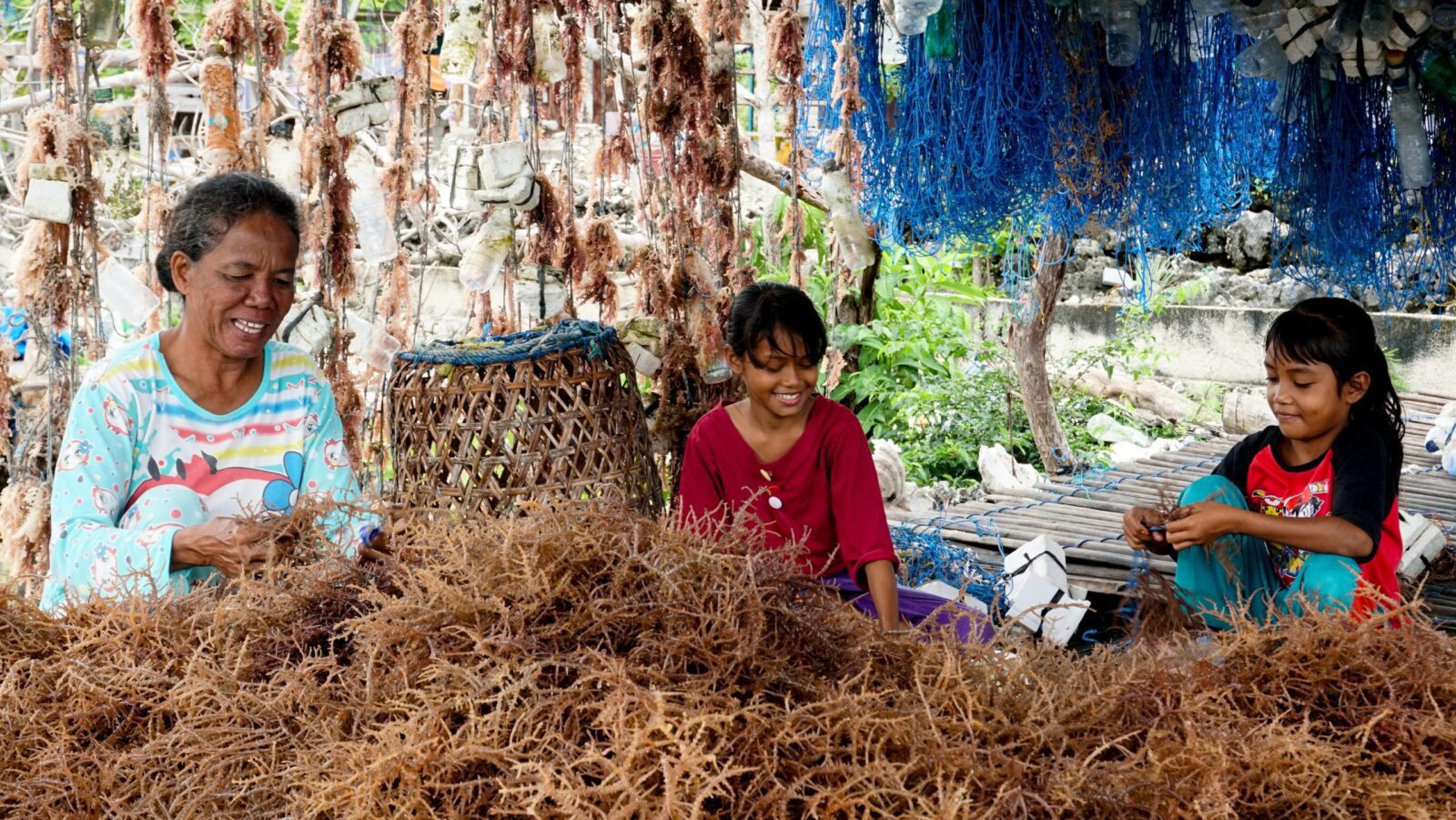
Seaweed farming in Wakatobi | Photo: Forkani
Her youngest daughter Agis, is still in kindergarten. Now that the kindergarten is closed, Agis’ teachers come and teach her and some of the other children in her area at home, but just for the morning.
“After midday, I have to help her do her homework,” said Mama Asrami. “We also need to spend more on the things she needs for learning, like books and paper,” she added.
Nurmayanti told me, “Alongside working hard to sell their husband’s fish catch, looking after their children whilst the schools are closed has been a big challenge”. From her voice, I could tell that she empathises with the everyday struggles of these women.
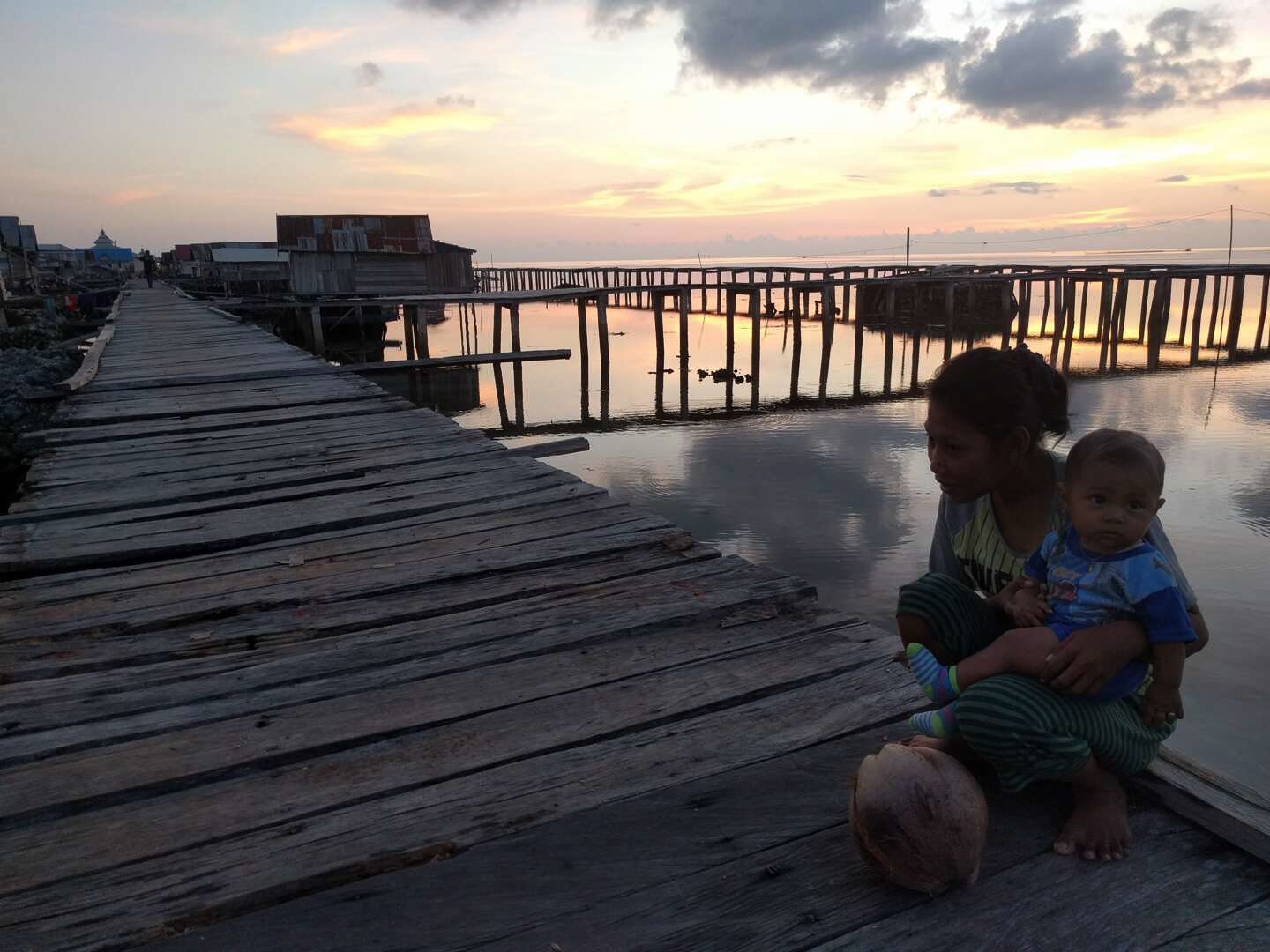
A mother and child in Kaledupa | Photo: Alasdair Harris
Men earn a living for the family and ensure community security
In Sungai Nibung Village, Kubu Raya, West Kalimantan, Alfi – who works on Yayasan Planet Indonesia’s (YPI) health programme – has been observing how fishermen are coping with the pandemic. Sungai Nibung is one of the locations where YPI supports sustainable natural resource management through fisheries programmes, which aim to protect mangrove ecosystems by implementing a temporary coastal closure system, involving the community to conserve marine environments in a sustainable way.
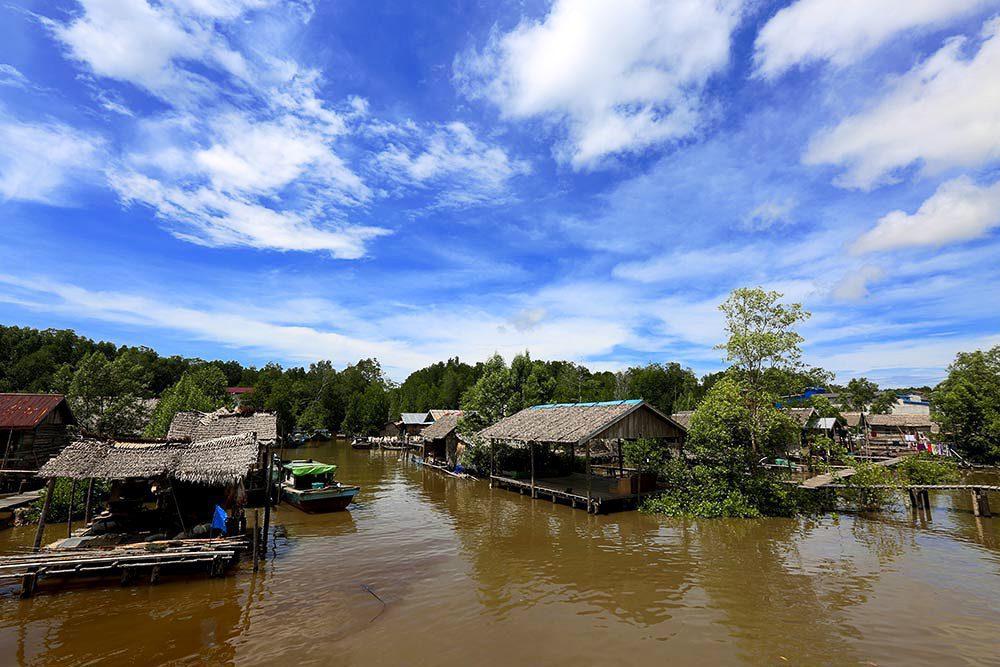
The traditional houses in Sungai Nibung Village | Photo: YPI
“Most men in the Sungai Nibung community are responsible for making a living to provide for their families. That’s why for men here, the impacts of COVID-19 have led to concerns around financial insecurity and income loss,” Alfi said to me over the phone, in one of our regular catch ups.
She told me about her conversation with Arif Suandi, a fisherman who is also the head of the Rukun Tetangga (neighborhood group) in the village.
Life is harder during the pandemic. Of course, mud crab and shrimp prices dropped, but that wasn’t the only challenge. The distribution system was interrupted meaning that some necessary goods weren’t being delivered, including ice which keeps our catch fresh. This meant we had to stop fishing almost entirely,” Arif said.
Due to large-scale social restrictions implemented by the government, the distribution channels of foods and goods for both consumption and fishing purposes were interrupted; this hit the remote Sungai Nibung community particularly hard, as they depend on a supply of goods from urban areas. This also resulted in reduced sales of seafood products from fishermen from coastal areas to consumers in urban areas, reducing the income of coastal communities.
As well as trying to provide for his family despite these limitations, Arif has also been actively involved in raising awareness of COVID-19 prevention guidelines around his community. “As a head of the neighbourhood, I encourage everyone to stay healthy and avoid any large social gatherings. It’s my role,” Arif explained.
When it comes to crises like the current pandemic, men often play a broader role to protect the people in their community.In many communities, men mostly take on such leadership positions, so when it comes to crises like the current pandemic, men often play a broader role to protect the people in their community.
In Bulutui, North Minahasa, North Sulawesi, where Blue Ventures’ partner, YAPEKA, works together with the community to develop local management of octopus fisheries, there is a similar trend for men in the village.
“As well as fishing, I also work as a member of the COVID-19 Task Force in response to the pandemic,” said Munir Maun, a fisherman in Bulutui Village, to Efra, a staff member at YAPEKA, “We monitor the village borders and make sure that no mass gatherings happen, and ensure the smooth delivery of the central government relief program”.
In most cases, groups like the Bulutui Task Force are dominated by men. It means that beyond having to provide the family, men need to allocate their time and energy to take care of communities’ safety.
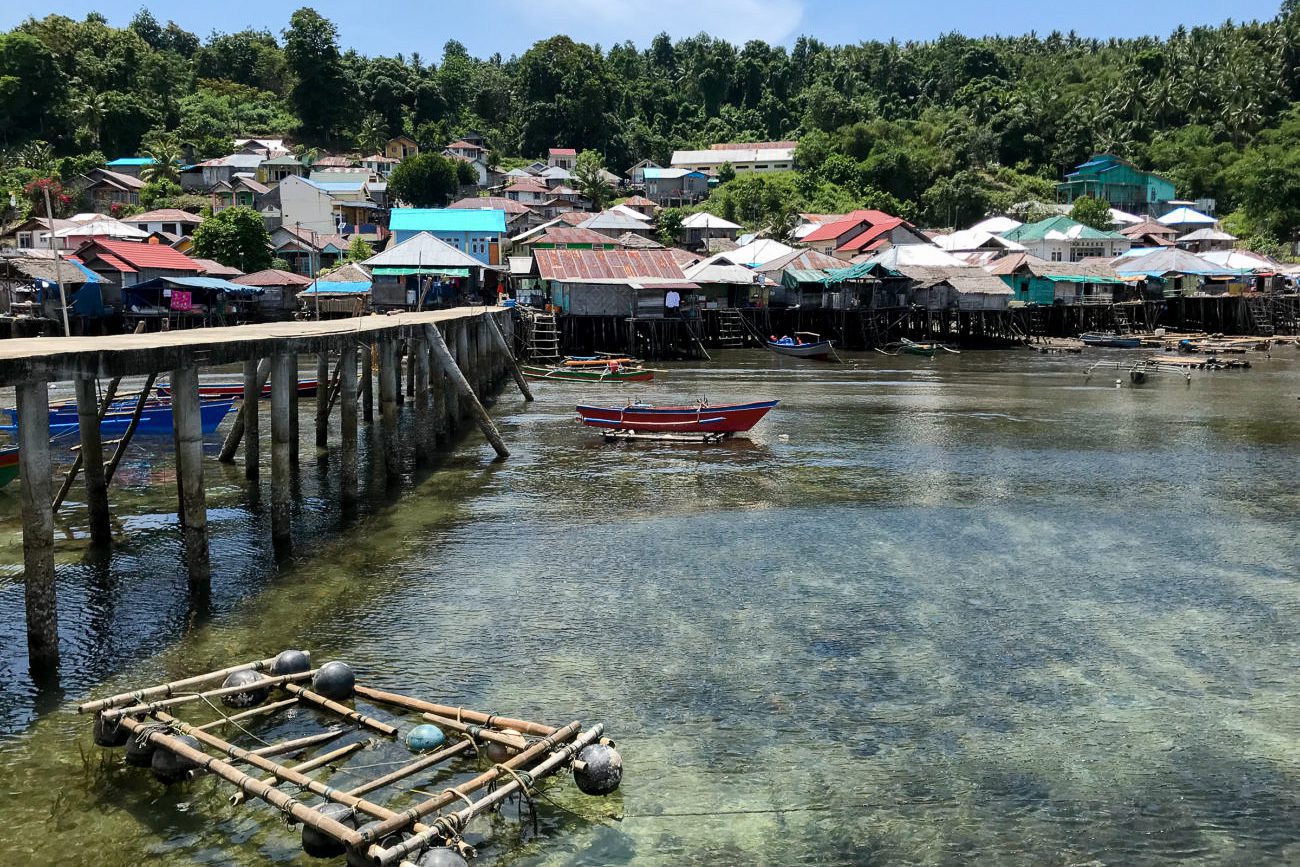
A view of Bulutui village from the dock | Photo: Lugas Hakim
Welcoming the new normal
Today, coastal communities in Indonesia are still trying to protect themselves from COVID-19, while at the same time adjusting to a new way of life
Today, coastal communities in Indonesia are still trying to protect themselves from COVID-19, while at the same time adjusting to a new way of life, where income-generating activities must be adapted; market demand for seafood is gradually increasing again and fishers are now back at sea while trying to keep up social distancing and pay attention to their health.
Meanwhile, our partner organisations continue to support the communities in the best way that they can, developing solutions for both men and women.
In Wakatobi, Forkani is working together with the government as part of the COVID-19 Task Force in Kaledupa, to help deliver relief and health supplies to the community. The local market has reopened, and Bajo women no longer need to push carts from village to village.
In Kubu Raya, even though the price of fish is still quite low, the market has reopened, so Arif and other fishermen in Sungai Nibung Village have continued to fish to provide for their families.
Arif himself is a member of Conservation Cooperative (PUMK), YPI’s programme to strengthen the financial resilience of community members, as well as facilitating the marketing of sustainable production through a conservation cooperative scheme that addresses the root causes of biodiversity loss in vulnerable ecosystems in Indonesia. As a PUMK member who is actively involved in conservation activities, he has received some relief funds from the programme to support him and his family during the pandemic.
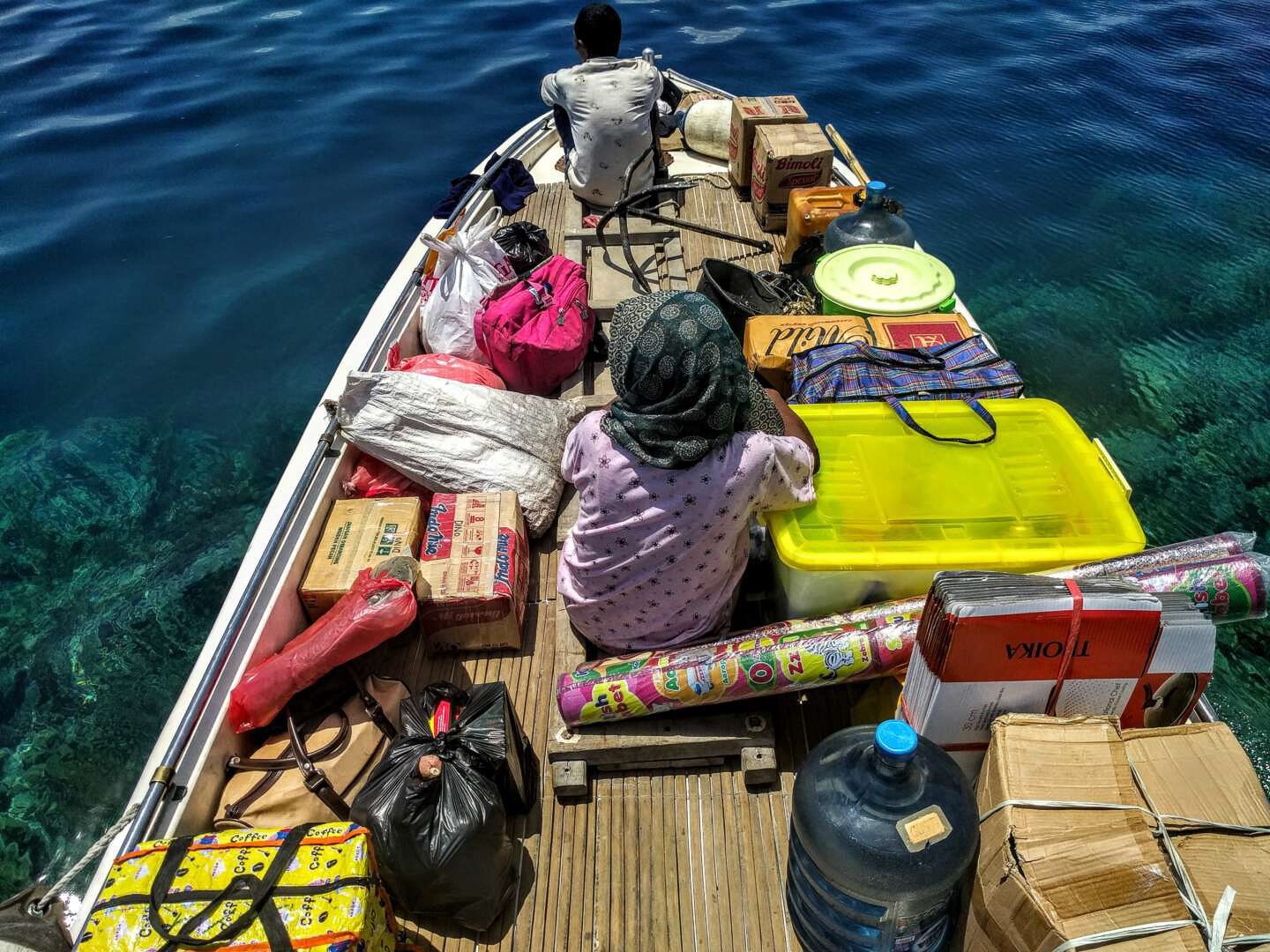
Both men and women are key contributors to the small-scale fisheries sector in coastal Indonesia | Photo: Alasdair Harris
These men and women, although struck by the same socioeconomic impacts brought on by COVID-19, are struggling in very different, but very real ways. Yet, the holistic support provided by YPI, Forkani and YAPEKA brings hope to these coastal communities, as they adapt to the new normal despite the challenges they face.
Learn about how our partners in Indonesia have been connecting through the pandemic


